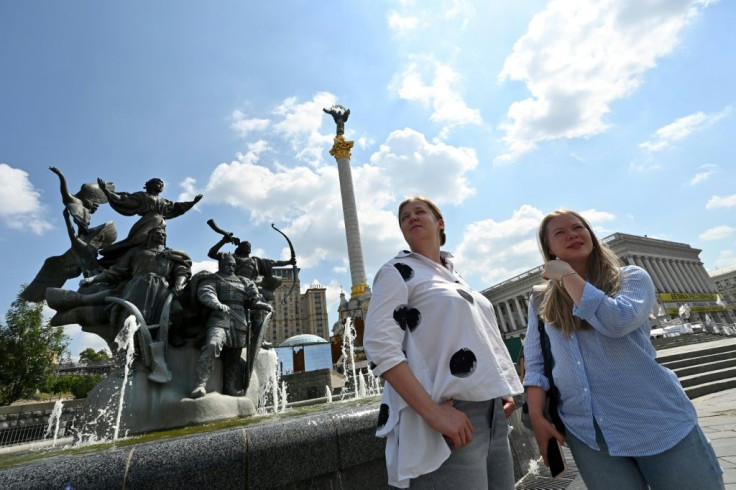Exiled Belarus Media Find Hope Over Fear In Ukraine
Journalist Anna Kaltygina holds back the tears as she recalls fleeing Belarus after security services raided the media outlet where she worked and arrested its editor and staff.
Now based in Kiev, capital of neighbouring Ukraine, she runs a team of journalists determined to keep reporting on their authoritarian homeland from exile.
Kaltygina is one of a growing number of Belarusians who have made Ukraine their home after last year's mass protests against the regime of Alexander Lukashenko.
In power since 1994, the moustachioed strongman has jailed hundreds since the demonstrations against him broke out over a disputed election last August.
He has also presided over an unprecedented crackdown on the media and rights groups that has reached beyond Belarus's borders.
This summer Western governments including the United States have slapped Belarus with several sets of sanctions.
Lukashenko's regime has been accused of trying to force home a sprinter from the Tokyo Olympics, and some have laid the blame of a suspicious death of a Belarusian activist in Kiev on his KGB security services.
In May, Minsk forced down a European flight to arrest a dissident, sparking international outrage.

For Kaltygina, the troubles began the same month, when the country's main independent news site Tut.by where she worked was shut down. The KGB raided employees' homes and arrested 15 people, including editor-in-chief Marina Zolotova.
Authorities said the move was part of a tax evasion case, but there is little doubt the popular website was targeted as part of the crackdown on dissent.
Since moving to Ukraine, Kaltygina and several other colleagues have launched a new media website called Zerkalo, or "mirror" in Russian, to continue their work.
The writers and volunteers are scattered throughout Ukraine and EU countries that do not reveal their identities for fear of reprisals on their families back home.
Belarusian authorities have already blocked access to Zerkalo's website in the country.
But the content remains accessible through an app and on the former social media accounts of Tut.by that still exist.

Since launching in July, the new outlet has taken on around 30 volunteers, including a dozen journalists.
Kaltygina said the "primary goal" is to do "everything for a new Belarus to emerge."
The 41-year-old said she wanted her jailed colleagues to know "that we have not given up".
While she believes she is safe in Ukraine, Kaltygina is nonetheless cautious.
The death of Belarus activist Vitaly Shishov, who was found hanged in a Kiev park earlier this month -- rattled Ukraine's community of opposition-minded Belarusians.
Kaltygina said she avoids "dubious events", does not share the addresses of the volunteers and "warns" colleagues of her movements.
Zerkalo's journalists are worried their families and friends back home could be punished as a result of their work.
Alexandra Pushkina, a PR manager with Zerkalo, said the launch was a "risk" for former Tut.by colleagues who remain in Belarus.
"For various reasons -- such as money or family -- they couldn't leave, many stayed," the 30-year-old said.
Wearing a red-and-white pendant representing the colours of the Belarusian opposition, Pushkina said "none of them" feel totally safe.
The media outlet does not employ anyone living in Belarus, which journalists concede can make their reporting difficult.
"We were very afraid of not being able to write about Belarus without being there," Kaltygina said.
But the editorial team relies on readers in Belarus who provide information and visual content, a collaboration that Kaltygina describes as "heartwarming".
When she reached out for reports on the conditions in a notorious Minsk detention centre, Kaltygina received "dozens of messages" within hours.
Belarus ranks 158th in the media watchdog Reporters Without Borders's World Press Freedom Index, which calls it "the most dangerous country in Europe for media personnel".
© Copyright AFP 2024. All rights reserved.





















